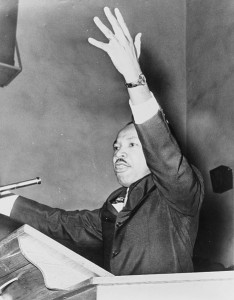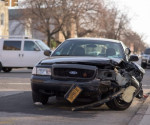Charlotte Observer quotes religious leaders on Martin Luther King Jr
The Charlotte Observer asked 15 Charlotte religious leaders to answer three questions as Americans approach another holiday honoring Dr. Martin Luther King Jr.
The questions: 1. What inspiration do you draw on Dr. Martin Luther King for your planned 2011 sermons?
2. What issues will you be preaching about that you think Dr. King would be interested in if he were still with us?
3. What message do we need to hear in the new year that could be considered part of Dr. King’s continuing legacy?
Here are their answers in full, unedited. – Tim Funk
Rev. Dwayne Walker, Little Rock AME Zion Church:
“I am inspired as I consider the life and legacy of Dr. King. He put his life on the line to say and do what he was purposed by God to do. He spoke to the social, economic and political issues of his day. He was never afraid to ‘speak truth to power.’ Like King, I feel it is my spiritual and moral responsibility to stand up and speak up to enable and empower the people of God to do the work of God as we hold society and ourselves accountable to ensure there is indeed ‘liberty and justice for all!’
I am concerned that as we all continue to struggle as we seek solutions to the economic crisis we are still experiencing, that budgets are not balanced on the backs of the poor and people of color. That has been our history. We need to find ways to address this issue without always giving to those who have, while taking from those who don’t!”
Rev. John Cleghorn and Veronica Rogers, Caldwell Memorial Presbyterian Church:
“Dr. King drew his inspiration from the Old Testament prophets, including Micah, who asked: ‘What does the LORD require of us?’ Micah answered: ‘Do justice, and love kindness, and walk humbly with God.’ Justice, kindness and humility provide a timeless equation for the ongoing work of racial reconciliation. At Caldwell, we will be asking ourselves where injustice, intolerance and hubris remain and impede racial reconciliation, not just between whites and blacks but among all peoples in today’s pluralistic America.
In our service Sunday, we will include the voices and faces of multiple races out of the belief that Dr. King’s dream was, by nature, inclusive. We will remember Dr. King’s message of treating others fairly, honestly and with dignity; of caring for our neighbor’s well-being and for protecting the rights of those who have no power; of welcoming the stranger in our midst and ending exploitation of others for personal gain.”

1962 New York World-Telegram and the Sun staff photographer Martin Luther King, Jr., half-length portrait, facing left, with left arm raised, at freedom rally, Washington Temple Church / World Telegram & Sun photo by O. Fernandez.
Rev. Lib McGregor Simmons, Davidson College Presbyterian Church:
“In 2011, issues of war, racism, sexism, global economic disparity, environmental deterioration, homophobia, and gun violence will continue to call people of faith to theological reflection and action. As a pastor, I draw courage from Dr. King’s vision of hope and his unwillingness to keep silent wherever there is injustice. I keep being led back to his conviction that Christ calls us away from self-interest and toward love of neighbor, that is, to communion with the human family and the whole creation.”
Rev. Robin Tanner, Piedmont Unitarian Universalist Church:
“The call to justice over violence must ring out again. As Dr. King declared, ‘we must rise to the majestic heights of meeting physical force with soul force.’ My prayer on this eve of Martin Luther King Jr. Day is to kindle the soul force within us that we may at last see violence as unconscionable.”
Rev. David Chadwick, Forest Hill Church:
1. King’s steadfast courage and commitment for justice – a major theme of Jesus’ teaching. It’s a continual inspiration for me as a leader.
2. I’ll be focusing on who Jesus is, which includes his justice and equality for all. You can’t focus on Jesus without seeing this too.
3. Racial inequality has not gone away. The challenge for us all is now, I think, in the church not simply to see different ethnicities and colors in our weekly worship but that we’d truly be in relationship with one another, in small groups, serving together and one another within the same church community. This alone refutes the challenge that ’11 o’clock on Sunday’s is the most segregated hour in our nation/community.” That is when true unity in Christ and racial reconciliation will be evidenced, again, when we’re in community with one another, living life together, with one another.
This last point is the most important. I think your readers need continually to be asked (as I need to ask too to FH worshipers, from up front), not just do we believe in racial reconciliation but how are we in true relationship and community with people of different colors and ethnicities?”
Rabbi Judy Schindler, Temple Beth El:
“Just as Dr. Martin Luther King dreamt of who we could become as a country, we need to dream, as well. Just as Rosa Parks was tired, not only physically at the end of a long workday, but spiritually and emotionally exhausted by the inequities of her generation, we need to be tired of the educational and economic inequities of ours. There is a time to sleep and dream and there is a time to wake up and act. Dr. King would call us to awaken to the racial tensions that exist in our community, to admit our collective wrongs that led us to this place, and to act on all sides to heal them.”
Rev. Pat Earl, St. Peter’s Catholic Church:
“In Luke’s gospel Jesus begins his ministry by reading from the prophet Isaiah: The Spirit of the Lord is upon me, because he has anointed me to bring glad tidings to the poor. He has sent me to proclaim liberty to captives and recovery of sight to the blind, to let the oppressed go free, and to proclaim a year acceptable to the Lord. In answer to the first question I would say the same ‘Spirit of the Lord’ inspires us all. It’s that inspiration that Dr. King said yes to in his life and in his preaching. What I hope for myself is to say the same kind of thorough-going yes to the Spirit as Dr. King said.
In answer to the second question the issues Isaiah lists continue to be the perennial, human issues we have to deal with: good news for the poor [a better life for the poor], freedom for captives [liberation from what holds us in fear], sight for the blind [insight into our shared human problems leading to compassion], ending oppression [freedom from domination and the need to dominate others], recognizing God’s acceptance [learning to live in gratitude for life’s deep-down goodness]. These fundamental issues have taken on different shapes historically, but the core issues remain the same. In his day Dr. King saw these same issues as inevitably wedded to working for peace in the world and to opposing war. In our day involved in two wars, as we are, the same connections need to be made.
In answer to the third question, we need continually to be reminded that the Spirit of God is indeed alive and active within and among us – moving us, calling us, provoking us – to take up the same work Isaiah, Jesus and Dr. King took up. Our response to the Spirit – our yes or our no – is in what we actually do with our lives. Will we live for self or for others? Gandhi, about whom Dr. King wrote his doctoral dissertation, would remind us: We must become the change we want for our world.”
Imam Khalil Akbar, Masjid Ash-Shaheed:
1. I have no plans for any special sermon; but I do plan to continue our tradition of sermons that mirror so much of what he stood for. We are from the same struggle for social justice as Dr. King and other African Americans. This is the reason that Muslims from our ethnic group identify with the struggles for Freedom, Justice and equality for all people. Often our sermons are influenced by and reflect this sensitivity. We believe, as he did, that ‘injustice anywhere is a threat to justice everywhere.’
2. Aside from seeing Dr. King as a devoted Christian and socially active person, I consider him to be a person whose social consciousness transcended the boundaries of faith traditions, ethnicity, nationality and race. He was truly universal with his language that appealed to the common human decency possessed by most human beings. This explains Dr. King’s embracement of Gandhi’s non-violent approach to Human and Civil Rights.
Today, he would be in the forefront advocating for Human Rights. His advocacy would embrace the hot button issues of poverty and the diminishing middle class, the problems of today’s family life that have spiraled out of control resulting in most homes being headed by single parents. Accordingly, teen pregnancy, drug abuse, crime, overcrowded prisons, affordable Healthcare for all of our citizens, etc, would be high on his list of priorities.
3. I think that his legacy will be continued by those who engender a message advocating the need of jobs for our citizens, self determination, a non-discriminatory society that tolerates no injustice against any person, affordable healthcare, quality education for every child in America, affordable houses and by a message that speaks universally to truth and justice. The message of moderation as opposed to extremism, no matter who is responsible for it, would certainly be in line with continuing his legacy.”
Rev. Clifford Jones, Sr., Friendship Missionary Baptist Church:
“Dr. Martin Luther King, Jr. was a Christian preacher and his foundation was the Holy Bible and Christian Church. Reading his book ‘Strength to Love’ reveals some 50 years ago his concern was threefold; jobs (the economy), racism, and the war. These are three stumbling blocks in this, the 21st century. Laced tightly to all of Dr. King’s efforts for human rights were cords of love for our enemy, hope in the innate goodwill clothed in human flesh, and an indestructible faith in a God who is universal in scope and personal in practice.”
Rev. James Howell, Myers Park United Methodist Church:
“We will be at precisely the mid-point of our two week revival, and a premise of it is that for the Christian life to make sense, it’s not merely a personal relationship with God but a comprehensive way of life, including how we relate to others, especially those who are different, or with whom we’ve had strained relationships; so over the King weekend we’ll look at what it means to work toward reconciliation, highlighting stuff like King’s words: ‘Love is the only force capable of transforming an enemy into a friend.'”
Rev. Steve Shoemaker, Myers Park Baptist Church:
“There is no year where I do not quote Dr. King and draw upon his influence. Two points come to mind. The first is that he kept pushing our nation on forward from one justice issue to the next, and at each stage drew great criticism from different groups, some formerly his supporters. First the race issue, then the issue of economic justice across racial lines, then the Vietnam War. I am still amazed at the endurance of his bravery. Secondly, I recall that he said that the vitality of religion is found at its edges, not its secure center. We need always to be venturing to the edges where the vitality of faith is found and embodied.”
Rev. Ricky Woods, First Baptist Church West:
“I think the singular issue that would be of concern for Dr King today is the absence of justice and by justice I meant right relationships in the community that respects and values all persons as human and being human demanding a certain level of respect. The absence of this kind of justice can be seen everywhere from political rhetoric that demonizes individuals, the pawns children become in the education system, how the need for health care has been so polarized that the wealthiest nation on earth has persons dying everyday from preventable diseases.
Dr King liked to quote the prophet Amos: ‘Let justice roll down like water and righteousness like a mighty stream.’ It is unfortunate that we have more so many technological advances that Dr King may have never dreamed but so few advancing in justice as the Arizona shooting so vitally shows. I will be talking form the pulpit about justice this week just as Dr King did years ago and like him preach hopeful that the justice thing takes hold and a beloved community emerges.”
Rev. Russ Dean, Park Road Baptist Church:
“The legacy of Dr. King looms large for those of us who hope to offer any ‘prophetic voice’ in our preaching. While celebrating the significant strides we have made as a nation, I am continuously aware of the great lengths yet to be traveled before we can know his Dream as our reality – and his words cut to the heart of the challenge I face as a preacher in an affluent, predominantly white congregation: ‘We will have to repent in this generation not merely for the hateful words and actions of the bad people but for the appalling silence of the good people.’ The political strength, theological clarity, and prophetic courage of Dr. King’s voice is a critique to the silence I offer – every time I fail to speak to the many injustices in our world.”
Rev. Greg Busby, First United Presbyterian Church:
“I draw a lot of inspiration in preaching from Dr. King’s ideas on our inter-connectedness as human beings. He used Scripture to lift up our common link as God’s children, which is central to the Christian gospel. I think Dr. King would be interested in issues like lingering racial tensions in America. He’d also be interested in ways the faith community can come together to address economic hardships in our community. I believe the idea that people can have differences without being divisive is one of Dr. King’s lasting legacies.”
Rabbi Murray Ezring, Temple Israel:
“The image of Abraham Joshua Heschel marching with Martin Luther King Jr., remains etched in my memory. Those powerful memories of my youth guide me as an adult. The courageous stance for equality and freedom in education, job opportunities, and position in our society guide me today. Our congregation’s partnership with Huntingtowne Farms Elementary School, our efforts on behalf of the homeless, the ill, and the forgotten, our concerns for those trying to find their place within the borders of this land, all stem from the images of Dr. King which remain within me and the hearts and minds of the congregants of Temple Israel.”















